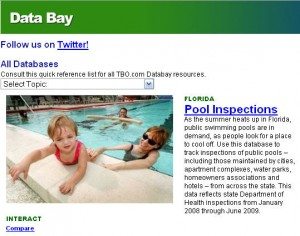 If your goal is to produce a sticky Web site, data is one way to get there. Providing lots of information that people can explore on their own will entice some of them, at least, to spend time on the site. That’s part of the thinking behind the Data Bay at tbo.com, the Web site of WFLA-TV and the Tampa Tribune.
If your goal is to produce a sticky Web site, data is one way to get there. Providing lots of information that people can explore on their own will entice some of them, at least, to spend time on the site. That’s part of the thinking behind the Data Bay at tbo.com, the Web site of WFLA-TV and the Tampa Tribune.
“In our shop, it’s Web first, period,” says WFLA reporter Mark Douglas. With that in mind, whatever data he collects while reporting goes online as quickly as possible. When a pet python killed a Florida toddler, Douglas asked the state fish and wildlife service for a list of everyone licensed to own reptiles. The list included home addresses and phone numbers, as well as the license expiration date.
The Data Bay has dozens of entries, from boating accidents to pool safety. Who’s on your payroll?, lists government employee salaries. “It’s off the charts popular,” says Douglas.
Using Caspio Bridge, an online application, the Web team makes the data searchable. The salary database, for example, can be searched by name, job title, employer and salary level.
The data team adds context to the data via a regular blog, Fact Finders.
At a recent SPJ workshop, Douglas shared dozens of story ideas based on publicly available data. Among them:
- Check the credentials of new government hires–do they have bogus degrees?
- Look through search warrants–they can tell you what the cops won’t.
- Scan professional licenses for violations and sanctions.
- Compare the state fugitive database with vital statistics–how many of the people the cops are still looking for are actually long dead?
A relatively new online database, NamUs, may also be worth exploring. The National Missing and Unidentified Persons System contains two databases–one for unidentified remains and one for missing persons–with search engines anyone can use to look for a match.








